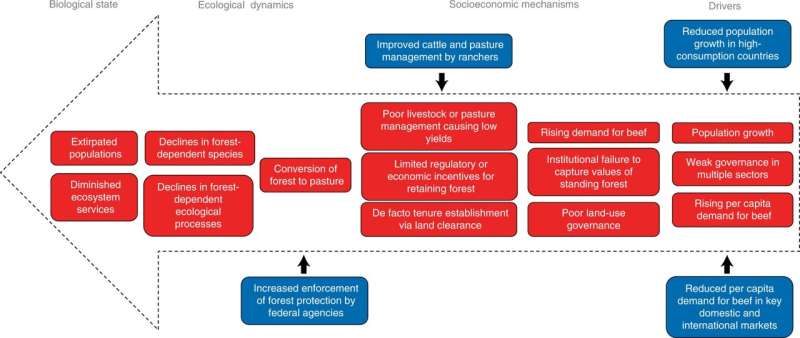Adopting behavior change interventions can benefit conservation

Because most environmental pressures come from people's behavior, environmental scientists are starting to work with behavioral scientists to explore how insights from behavior change interventions (developed to help people quit smoking, or loose weight for example), may be applied to the problems facing nature.
Professor Julia Jones of Bangor University's School of Natural Sciences is co-author on a recently published paper in Nature Human Behavior arguing that combining behavioral science with environmental science would bring about benefits for the environment, and ultimately for us.
Writing in the 'perspectives' paper, the authors say that there is an unrealized potential for behavioral science to address the snowballing biodiversity crisis.
Dr. Kristian Steensen Nielsen from the University of Cambridge and the study's lead author said: "Because human activities have caused the biodiversity crisis, conserving and restoring biodiversity will require fundamental changes to our current behavior. Despite the central importance of addressing human behavior, biodiversity conservation has not been a major research topic in behavioral science. Similarly, current research and practical efforts to conserve biodiversity have only paid limited attention to behavioral science and integration remains limited."
Professor Julia Jones said, "There has been an explosion of interest in the potential for insights from the behavioral sciences, including so called 'nudges,' to be applied to the threats facing biodiversity. However real-world applications have mostly been quite small-scale and localized."
"This project, led by Professor Andrew Balmford of the University of Cambridge, has a vision to stimulate much greater work in this area and reveal which sort of interventions have the most potential to change the behaviors which have the most impact on biodiversity."
Julia was one of 22 participants who came together at a workshop in January 2020 to work out how and where behavioral sciences have the most potential to impact conservation.
At the workshop they investigate 12 scenarios and identify the 'threat chains' and the influential groups whose actions could be changed.
Using Amazon forest deforestation as an example, they describe the multiple pressures on forest deforestation and multiple behavior changes which could make an impact, locally and globally. These include beef consumers across the globe, policymakers who undervalue forest retention, and ultimately ranchers who are incentivized to convers forest to pasture.
Equally, closer to home, the continued illegal persecution of birds of prey in the UK is the result of choices by some gamekeepers to shoot and poison raptors to limit predation of red grouse, the choice of some hunters to pay exceptionally high prices for large daily 'bags," and choices of policymakers to resist attempts to tighten regulation of the shooting industry.
The main priorities were to identify the most impactful behaviors needing change and those most susceptible to change through interventions or 'nudge' techniques, which when considered together can help identify the behavioral changes most likely to deliver benefits to nature.
"Tackling grand societal challenges such as the existential threat that the biodiversity crises represents cannot be addressed by any one discipline and thus such interdisciplinary conversations must become common features of our intellectual life" said lead author Kristian Steensen Nielsen.
More information: Kristian Steensen Nielsen et al, Biodiversity conservation as a promising frontier for behavioural science, Nature Human Behaviour (2021). DOI: 10.1038/s41562-021-01109-5
Journal information: Nature Human Behaviour
Provided by Bangor University



















